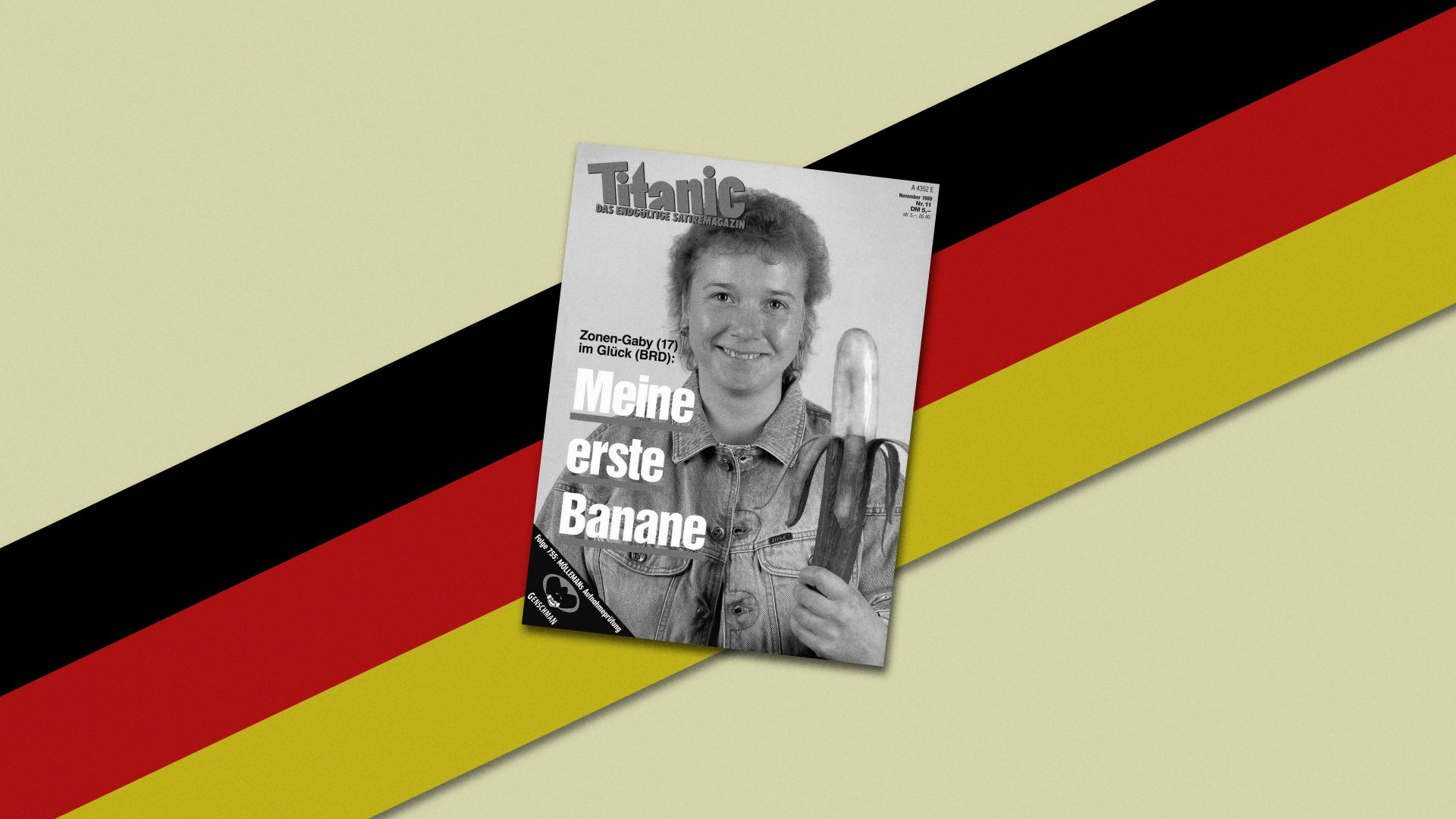Do you ever wonder how, when you read the words “Albert Einstein’s tongue” or “William and Harry behind their mother’s coffin”, you immediately see the picture in your mind’s eye, without actually having the photo in front of you? This is visual memory at work.
In German visual memory, there is a picture you have probably never heard of: Zonen-Gaby. It shows a young, seemingly East German woman (tight-curled perm, moon-washed denim jacket) smiling, overjoyed. What she proudly holds in her left hand, clearly thinking it’s her first banana, is in fact: a cucumber, peeled banana-style.
The picture is staged, of course. In 1989, it was on the cover of the satirical magazine Titanic and at least half the country (guess which half…) still hails it as a hilarious caricature of fruit-deprived, hideous Ossis (East Germans).
So upon reading the latest private text messages of Axel Springer CEO Mathias Döpfner (disclaimer: my former boss) that were leaked to damage his reputation, I was surprised he hadn’t mentioned Zonen-Gaby, too. Instead, he described Ossis as either “Communists or Nazis. Nasty”. A journalist coming to his defence said that this was what 60% of the country also thought, which may be true.
I haven’t Germansplained this Ost-West issue so far because, as a child of the Bundesrepublik, I’m not really the right person to do it. To me, November 9, 1989 is the single most beautiful day in history. When I see historic footage of Trabi car convoys surrounded by cheering strangers hugging each other – even now, just writing about it – I well up.
Back then, my family (after gulping down lots of champagne in front of the telly) finally visited Weimar without being hassled by DDR frontier guards. We felt happy for the millions of our countrymen who could now speak and travel freely. To us, there was no downside to freedom. There still isn’t to me. However, I never experienced the cataclysm of my daily life falling apart. Shops, schools, TV shows, food brands, people – replaced. Not the jobs, though. They just vanished.
The confidence my upbringing gave me meant that I was never much bothered by unknown social codes. For millions of others, their confidence was shattered overnight. It hasn’t been boosted since, despite the economy slowly picking up.
During the mid-’90s, I interned at a local newspaper desk in Zeitz: a charming little town in Saxony-Anhalt that had lost a third of its population within five years. Unemployment was at 25%. And yet I, the Wessi on safari, was greeted with a lot of Gastfreundschaft (hospitality).
Later, when working for Axel Springer (whose founder had been labelled loony for believing in a unified Germany), I learned enough from eastern colleagues to understand the depth of my ignorance. How most of them identify as northerners, for instance, or Leipzigers, Thuringians and Brandenburgers – not as East Germans. A new book The East: A West-German Invention is currently a bestseller. In the east. The west doesn’t care, as usual.
A 2019 poll showed that 17% of west Germans haven’t even travelled to the former GDR (but they have been to Mallorca, I guess). A lot of Ossis had to move and probably felt like James Herriot when meeting Siegfried Farnon in All Creatures Great and Small. Treated with the same arrogance, minus tweed and respect.
In turn, the west German civil servants who were sent east to implement our administrative and judicial system received what was labelled a Busch-Zulage (bush bonus). Just a hint of colonialism there. Even now, east Germans are in no way represented adequately among political and business leaders – one of Germany’s biggest diversity problems.
None of this is an excuse to turn ostalgic (the sentiment of GDR nostalgia) or to vote extreme (the AfD-Führung is overwhelmingly west, unlike the electorate). And it is former Bundespräsident Joachim Gauck and other members of the GDR civil rights movement who often are the first to criticise these phenomena.
Without the west, the ex-GDR would be a typical transition country like Poland or Hungary – going through all its challenges as one nation, together. Paradoxically, because of reunification with a dominant western brother, our country lacks this togetherness. The point is: there should be no “us against them”, or vice versa. It’s us against socialisation.
Someone socialised in the GDR, for instance, would probably have been a lot more guarded in text messaging stereotypical thoughts to assumed friends. And I’m not entirely sure that’s a good thing




